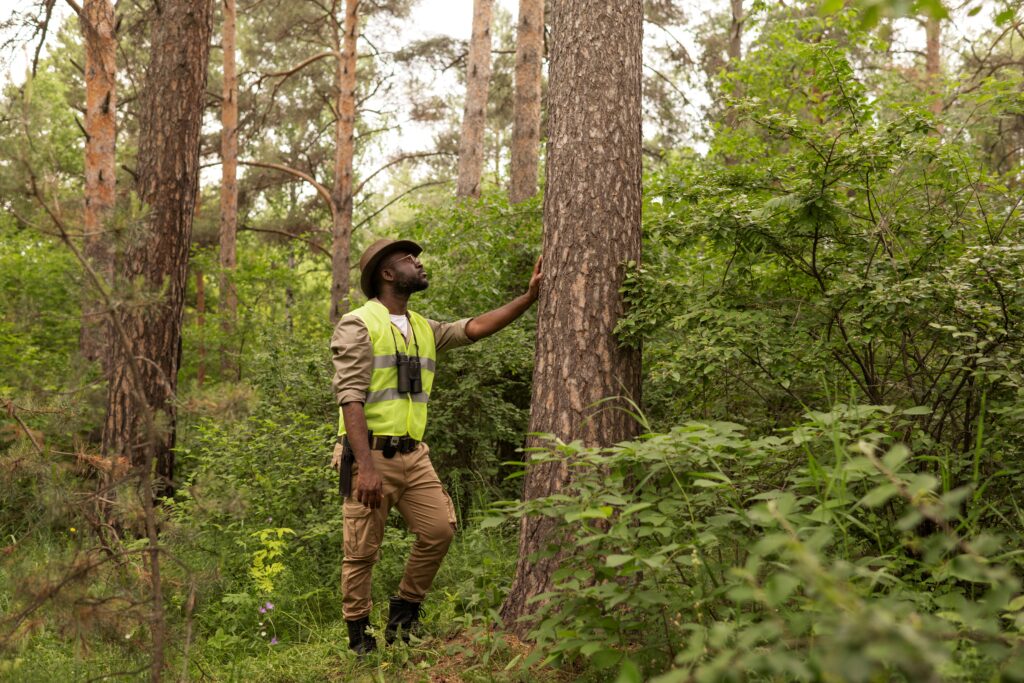Faced with the challenge of climate change, responsible forest management has emerged as a key element for carbon neutrality. With 43.5% of the EU’s land surface covered by forests, it is crucial to transform this ecosystem.
Forests are essential ecosystems in the fight against climate change, acting as important carbon sinks and storehouses. Each year, they absorb the equivalent of 7% of the European Union’s total greenhouse gas emissions. There are currently 159 million hectares of forest in the EU, representing 43.5% of the land surface. This forest area coverage can vary substantially from one member state to another, from just over 10% in Malta to around 70% in Finland.
This ecosystem faces numerous and growing challenges from deforestation to forest degradation and forest fires.
The forestry reforms and policies implemented so far are not enough to achieve the goals we set ourselves in terms of reaching carbon neutrality, balancing greenhouse gas (GHG) emissions, and combating climate change.
Responsible forest management is an urgent and essential issue so as to maximise the carbon sequestration potential of forests, guarantee the health of forest ecosystems, and contribute to balancing greenhouse gas emissions.
Healthy Forests and the Challenge of Forest Fires

According to the report ‘Forest Fires in Europe, Middle East and North Africa 2022’, published by the European Commission’s Joint Research Centre, although 96% of forest fires are caused by human activity, they are exacerbated by the increased hazardous conditions brought about by climate change. In 2023, forest fires burnt around 500,000 hectares of natural land in the European Union, reflecting a growing challenge for forest management.
To mitigate the risks and impacts of forest fires, it is essential to adopt an integrated approach to responsible forest management, which includes prevention and public education about the risks of forest fires and the importance of responsible behaviour. But it also includes early detection of fire outbreaks through advanced monitoring technologies such as satellites and drones, allowing for quick and effective responses. In addition, preventive forestry and investment in both training firefighting teams and appropriate equipment are vital to increase the effectiveness of fire containment and extinguishment. Land use planning is also essential, with policies that prevent uncontrolled urban expansion in forested areas and promote the preservation of natural vegetation corridors and green areas, which also contribute to forest resilience.
Responsible Forest Management as a Break on Climate Change
Currently, much of human society has at least some interaction with forests and the biodiversity they integrate. All beings that inhabit Planet Earth benefit from the functions stipulated by the components of this biodiversity, whether in the carbon, water, and nutrient cycles, or through the connections with food production.
Current negative trends in deforestation and forest degradation have a significant impact in terms of biodiversity loss and increased CO2 emissions. These activities, often driven by agricultural expansion, unsustainable logging, or urbanisation, undermine the ability of forests to act as carbon sinks and maintain their essential characteristics and functionalities.
We should also address the fact that biodiversity loss compromises the health of ecosystems, reducing their ability to provide intrinsic functionalities essential to humanity, such as pollination of agricultural crops, climate regulation, and water purification. These impacts hinder progress towards the goals set out in the Sustainable Development Goals (SDGs), especially those related to climate action (SDG 13), life on land (SDG 15), clean water and sanitation (SDG 6), and zero hunger (SDG 2).
Therefore, a transformational change is necessary in how we manage our forests and their biodiversity, how we produce and consume our food, and how we interact with nature.
A realistic balance must be struck between forest conservation objectives and local needs and demands for resources that support livelihoods and well-being. However, this balance requires effective governance, environmental and social policies, respect for the rights and knowledge of local communities and indigenous people, and greater capacity to monitor biodiversity outcomes, as well as innovative financing arrangements.
Responsible forest management involves practices that preserve the long-term health and productivity of forest ecosystems. These practices include implementing conservation programs that protect critical forest areas and restoration initiatives that recover degraded lands, thereby increasing the carbon sequestration capacity of forests. But it also includes environmentally responsible forestry, by adopting forest management techniques that balance the production of wood and other resources concerned with the conservation of biodiversity and the maintenance of ecosystem functionality. It also accounts for the development and implementation of public policies that encourage the conservation and responsible management of forests, by collecting payments for environmental services, forest certifications such as the European Forest Certification Plan (PEFC) and the Forest Stewardship Council (FSC), and promoting environmentally responsible and socially fair value chains.
Furthermore, it is essential to promote education and consciousness, by raising awareness of the importance of forests and their biodiversity, as well as the impacts of climate change, by encouraging more responsible behaviour among consumers and producers. Local communities and Indigenous people must also be involved in forest management, recognising and respecting their traditional knowledge and territorial rights.
Complementary Activities
VIDEOS
LINKS
- https://www.europarl.europa.eu/topics/pt/article/20190926STO62270/como-a-ue-podera-atingir-a-neutralidade-carbonica-ate-2050
- https://www.europarl.europa.eu/topics/pt/article/20170711STO79506/usar-melhor-as-florestas-da-ue-como-sumidouros-de-carbono
- https://www.europarl.europa.eu/topics/pt/article/20230316STO77629/alteracoes-climaticas-os-gases-com-efeito-de-estufa-mais-nocivos-para-o-planeta
- https://www.consilium.europa.eu/pt/policies/green-deal/#what
- https://www.publico.pt/2023/08/18/azul/noticia/falta-reforma-floresta-podera-causa-meta-neutralidade-carbonica-2060326
- https://rr.sapo.pt/noticia/pais/2023/12/09/portugal-nao-se-compromete-com-a-neutralidade-carbonica-antes-de-2045/358531/Associar%20%C3%A0s%20celebra%C3%A7%C3%B5es%20do%20dia%20mundial%20da%20%C3%A1rvore,%20da%20floresta%20e%20da%20%C3%A1gua
- https://www.jornaldenegocios.pt/sustentabilidade/ambiental/detalhe/investir-na-floresta-trava-as-alteracoes-climaticas


